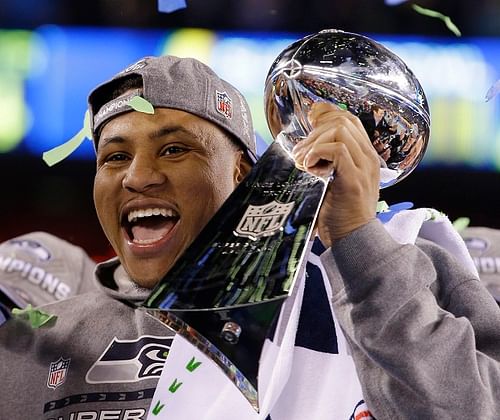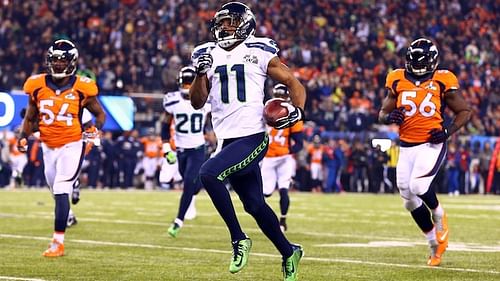
Super Bowl XLVIII: Malcolm Smith, the Stats Sheet MVP

A lot of sports are slaves to the stats sheets. We look at numbers catalogued on a sheet of paper and think that from that scientific information we can process and objectify the art that is a player’s performance.
Cricket is the most obvious example of that, but most of the big American sports share the affliction. Baseball, basketball and American football all rely far too much on stats to justify performance reviews and awards.
In the aftermath of this past Sunday’s Super Bowl between the Seattle Seahawks and Denver Broncos, it was American football’s turn to display its unsavoury reliance on statistics for the world to see.
As Seattle were crowned the world champions after a dominant 43-8 showing, little known Seahawks linebacker Malcolm Smith was named as the Super Bowl MVP, an award given annually to the player deemed to be the ambiguously titled most valuable player in the NFL’s biggest game. The MVP is decided 20% during the game by fans and viewers votes, and 80% by a panel of 16 American football writers and broadcasters.
“Lies, damned lies and statistics”
Reading the stats sheet of the game tells you that Malcolm Smith fully deserved the MVP recognition. He caught an interception in the first half and returned it 69 yards for a touchdown, and then recovered a fumble in the second half to all but seal the game for his team.

On the stats sheet Malcolm Smith looks like a shoe-in for the MVP, with an interception returned for a touchdown and a fumble recovery to go with his 8 tackles
On paper, Smith was the most eye-catching player on a defense that dominated proceedings. He recorded two truly game changing plays, and that is why he became the first defensive player to be named Super Bowl MVP since Tampa Bay’s Dexter Jackson in 2002. In that way, it makes sense that he would be chosen as the MVP.
However, that reasoning is woefully simplistic. Obviously stats don’t lie, but they often don’t reveal the full picture. Smith did indeed record two turnovers that changed the game, but he was far from the most valuable player on the field that night.
Let’s just remember, for a second, what MVP stands for; most valuable player. The emphasis is on valuable, suggesting that you were so in-valuable that your team could not have won the game without you. With that in mind, the award should be reserved for a player who was so devastating and unstoppable that his individual play affected the outcome of the game.
Although on paper it looks like Malcolm Smith did just that, devastating and unstoppable does not really fit his description. Smith’s play was not so much unstoppable as it was lucky; he happened to be in the right place at the right time and reaped the fortunes of good luck.
His first big play was the interception returned 69 yards for a touchdown in the first quarter. As you can see from the video below, all Smith had to do was catch the lofted ball under no pressure and outrun a single overweight offensive lineman for a touchdown.
These two signatures plays were special, although Smith’s part in them was not. The people that truly made those plays were Cliff Avril and Byron Maxwell. Theirs was the exceptional effort, and theirs should have been the credit for it.
The MVP selectors, however, failed to see the plays for what they truly were. Either in ignorance or laziness they saw these plays as exceptional efforts by Smith himself, and deemed him worthy of an award that would crown him as the most important player in Super Bowl XLVIII. The MVP award, not unlike the football on two occasions, quite literally fell into Malcolm Smith’s lap.
Deserving recipients
The question remains, then; if Malcolm Smith should not have been named MVP, who should have?
Those who watched the game in its entirety would know that there was no shortage of worthy candidates. A number of Seahawks players made key contributions to plays that ultimately determined the outcome of the game.
On defence, safety Kam Chancellor and pass rushers Cliff Avril and Chris Clemons were strong contenders. Chancellor set the tone of the game with the very first tackle on Demaryius Thomas, and later in the first quarter intercepted an errant Peyton Manning pass. He also recorded nine tackles, the second most on the team.

Percy Harvin (#11) returns the second half kickoff for a touchdown in Super Bowl XLVIII
(credit: rantsports.com)
Chris Clemons recorded the only sack of the night for either team and added to that with two forced fumbles. On the other end of the defensive line Cliff Avril had Peyton Manning looking uncomfortable in the pocket all night despite failing to record a single sack. Without Avril’s pressure, Manning’s two interceptions would not have happened.
On the offensive side of the ball, Percy Harvin was the sole MVP candidate. He touched the ball 4 times, and made every single one count to the tune of 137 yards. The receiver had two brilliant end-arounds, and an 87-yard kick return for a touchdown that he added to start the second half. It was that score which proved to be the straw that broke the camel’s back, or in this case the bronco’s back.
Truthfully though, there wasn’t a single Seattle player that really stood out on Sunday night the way most MVPs do. Instead, what we witnessed was a team playing together with almost faultless precision. Because of that, the award could have gone to any one of the Seahawks players who made big plays in the 43-8 win; Avril, Harvin, Chancellor, Russell Wilson or even Jermaine Kearse, who caught an impressive 15 yard touchdown.
What is clear is that Malcolm Smith didn’t really make MVP-caliber plays. He caught a ball that fell straight into his arms, and ran very fast in a straight line the other way. Then he fell on a ball that somebody else dislodged and which bounced right to him. There were many candidates for the Super Bowl MVP, but Malcolm Smith should not have been one of them.
The most worthy of unworthiness
With that said, I am personally delighted that Smith earned the MVP award. Logic, statistics and everything else aside, Malcolm Smith is the sort of person whose hard work in the face of adversity deserves some recognition.
While playing his college ball at the University of Southern California, Smith was diagnosed with a rare disorder of the esophagus known as achalasia, a disease that causes difficulty swallowing and regurgitation.
Smith would frequently vomit while trying to eat and lost 30 pounds in the process. Despite a surgical procedure, the condition is still an issue Smith has to manage to this day. He has dietary restrictions, he struggles to retain his playing weight and he must eat very slowly to avoid vomiting.
Malcolm Smith may not deserve to be named the Super Bowl MVP on the face of it, but that doesn’t mean we should begrudge him his moment in the sun. While he may not have been the most impactful player on the field last Sunday, he struggles and suffers daily just to keep on the same level as his teammates.
Impressively, he does manage to stay on the same level. Since getting drafted in the seventh round of the 2011 draft, Smith has been somewhat of a fringe player in Seattle, unknown to the public outside of the pacific north-west. He only earned a spot on the Seahawks’ roster this season because of his contribution to special teams.
However, Smith found himself on the field as a starter for eight games this season and he took advantage of the opportunity that was handed to him, intercepting passes in four of Seattle’s last five games. His last two interceptions, against the San Francisco 49ers in the NFC Championship game and the Broncos in the Super Bowl, are now two of the most pivotal plays in Seattle franchise history.
Smith worked the grind anonymously for three years, fighting to keep his spot on the most talented defensive roster in the NFL and at the same time fighting the urge to vomit every time he ate a meal. And now, thanks to the reliance on statistics, Malcolm Smith has the Pete Rozelle Trophy for his efforts.
The Super Bowl MVP panel made a mistake on Sunday, but it was the best mistake that they have ever made.